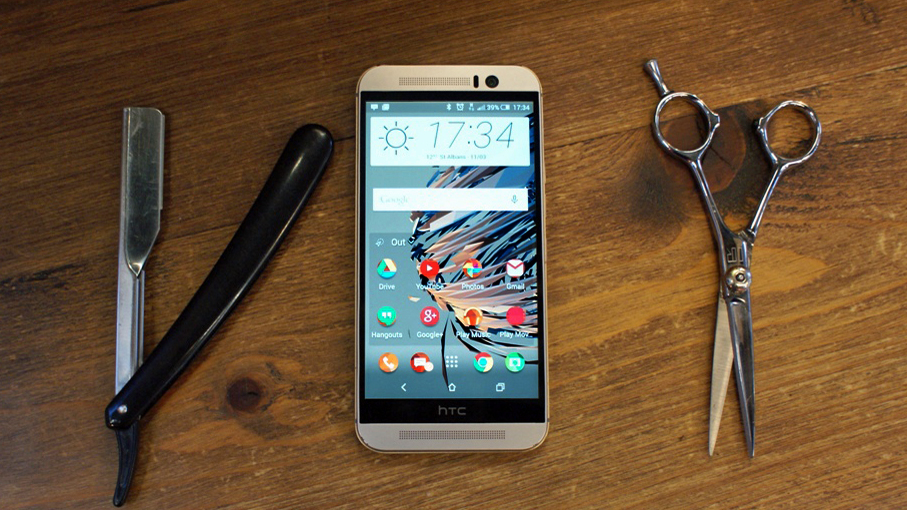Why you can trust TechRadar
Thinking about what's changed with the One M9 is where you'll realize that HTC really did hit a roadblock when it comes to innovation.
For a brand that's been so heavily into bringing something extra to the smartphone table – think BoomSound speakers, the duo camera, finding a way to get phone signal through an all-metal body – there's very little to shout about here.
It's disappointing, given I've become used to HTC being the go-to brand for cool new ideas – making the same phone as the previous year with a little more polish leaves me a little deflated.
And yet the phone costed so much more than in previous years – it's even more than an iPhone 6, initially. Of course, the market eventually corrected itself, but it's left a nasty taste in the mouth that the brand was asking for more just to get a slightly more refined design.
Surround BoomSound
What's better than hearing things? Hearing them in three dimensions of course! And that's just what HTC says it's done here, adding Dolby support to its BoomSound speakers (both with and without headphones connected) to create a virtual surround sound.
What this seems to mean in the real world is that the phone can now pump out sound for "theater" or "music" mode, and further improve the sound quality when you're listening to tunes over headphones.
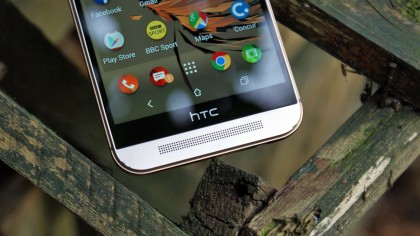
HTC has also created its own range of earbuds to allow you to get the best out of this optimized sound too, taking advantage of the extra power for your ears. It even offers different sound profiles for each of these sets.
Happier snapping
HTC has gone bold and ditched the Ultrapixel camera for the new One M9 - well, ditched it from the rear anyway. Last year's sensor is now used on the front of the phone; with the low light ability making selfies look much better.
The rear camera is now a 20.7MP affair, a very similar sensor to the one found in the Sony Xperia Z3 (although made by Toshiba).
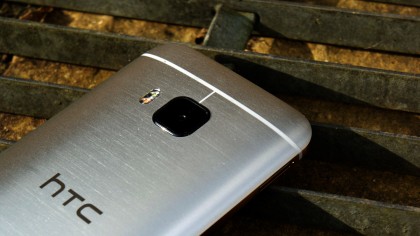
It's been heavily revised, and now offers a much sharper image for those that like to zoom into photos. It's lost a little of the low light ability, and colors are more muted, but overall is a much sharper and more competent sensor.
Four more cores
The HTC One M9 is powered by Qualcomm's Snapdragon 810 chipset, which was its top processor of 2015. This offers two sets of four cores (with only one set ever working at any one time), clocked at 1.5GHz and 2GHz.
That's backed up by 3GB of RAM, and this combination results in a very fast experience under the finger. It's not perfect still, as Android Marshmallow still seems to get in the way when doing things like pressing the multitasking button and letting the phone lag.
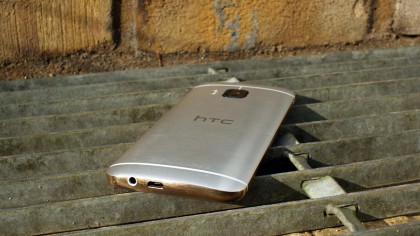
Like a lot of things on this phone it seems that it's fine when 'warmed up' - pressing the multitasking button will lead to a pause the first time, but press again and it's instant - but the first load is slow.
And there's the issue of heat. HTC and Qualcomm were subjected to some bad press in 2015, with the insane power of the 810 chipset meaning you can really run this phone hot through benchmarks and gaming, although not to the levels being described thanks to recent software updates.
In reality, the phone does get rather warm at times thanks to the metal body dispersing heat more evenly, and while it's clear the Qualcomm chip is running to a higher temperature it's nothing massive.
Go and go and go
The battery life on the HTC range has always been something to keep an eye on, as I've always found it rather 'slippy'. That means that even doing general tasks like browsing the web or checking football scores will munch down battery life a little fast.
The One M9 has tried to eradicate that problem by using the Snapdragon 810 chip (which can use a lower power set of cores to get you through the less taxing tasks) as well as whacking in a relatively meaty 2840mAh battery, which is only fractionally smaller than the one used in the iPhone 6 Plus.
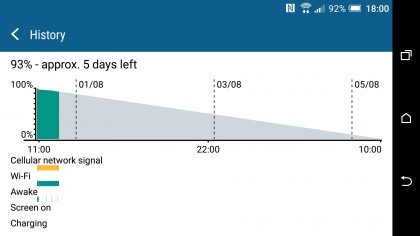
It's even bigger than the one used in the Samsung Galaxy S6, and combined with the lower pixel count should enable HTC to get a better battery life out of its flagship range.
Except, well, it doesn't. You can read more about this in the Battery section of the review, but HTC still seems unable to build a light interface that doesn't eat power when you don't want it to.
Looking at the statistics it seems that Android updating certain Google services is the main culprit, which is something usually associated with early software, so future updates might solve this. It took a while, but Android Marshmallow has finally started rolling out in 2016. However, we're only really noticing an improvement to the battery when not using the phone, and that's thanks to Google's new Doze feature.
So it's an OK battery life for HTC, and one that might get you through the day - especially if you're not a heavy user. But it will be close - and it's worse than the battery life on the One M8.
Storage hunting
Here's a big win for HTC: the base (and only) level of storage on the phone is 32GB, which means any apps that need to be kept on the phone's internal memory can do so happily without leading to the dreaded 'delete apps to free up space' message when you need to take a picture or download new software.
There's also a microSD slot on board to allow you to get more storage in there as well, with the upper limit of 128GB bringing the total available to 160GB for your One M9.
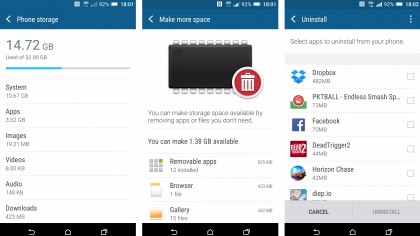
It's worth remembering that putting loads of extra info into the phone via memory card can have an impact on performance, so don't chuck too much on there that you'll need to use regularly as it will slow the phone down somewhat.
Sensing themes
HTC's Sense UI was overhauled again for the HTC One M9. Sense 7.0 comes with a few little tweaks - although it really looks very similar to the one we got before.
The big changes are through themes and the gallery, with both having a marked effect on the way you personalize your phone. The theme generator is actually pretty cool: take a snap of anything, the phone will analyze the image and create a full palette of colors to use with icons and app headers - plus the font and icon shapes will be altered to match the overall 'ethos' too.
You can choose different styles if you're not completely happy with the way the phone's suggestions work - but it's a very holistic way of making a picture work throughout the phone.
In keeping with HTC's more recent policy of updating such components separately from the core Sense UI, you can also apply the freestyle layout themes introduced with the HTC 10. These let you use and freely position stickers in place of app icons, giving your home screens a more organic and artistic look.
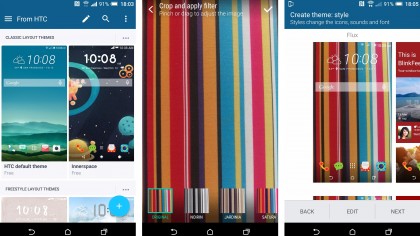
Practically speaking, I found this option a little awkward - I just wanted to be able to put my finger on the app icon I wanted at a glance - but I suspect that plenty of people will love the customization potential it offers.
Indeed, using the HTC One M9 at various points throughout 2015 and 2016 has shown that HTC is shaping and remoulding its Sense software experience on the fly, which can lead to some friction.
For example, the Cloudex service we mentioned in our original M9 review subsequently changed its name to the One Gallery app, before support was withdrawn altogether at the end of April.
This then left a useless shell of an app icon in the app tray where once there was an interesting new way to collate images from multiple sources. Now, after the Android 6.0 Marshmallow update, there's no sign of the service at all
Healthy performance
One of the interesting things about phones from the last few years was their ability to track fitness, the idea being that they'll always be in your pocket and therefore will give the best amount of info.
Despite partnering with Fitbit in 2014, HTC decided it needed its own version of a health tracker: HTC Fun Fit. You'll need to download this though, which is a shame – especially when you see some of the pre-loaded apps on the One M9 that I could live without happily.
Then again, Fun Fit doesn't seem like there's a lot of point to it for a number of reasons. Firstly, the rise of the fitness tracker has shown us that the phone is only so good for tracking steps, as it's not always in the pocket and therefore might not get all the data.
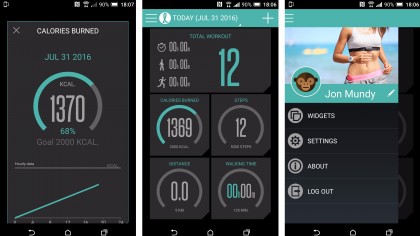
Secondly Fun Fit seems very limited beyond giving you information on what you've done in terms of steps taken or time spent running / walking. It's also a little useless, giving wildly incorrect results when working out how long you've been running for.
As part of a larger app, this stuff is great – and I love the cartoonish avatars, the ability to instantly sync up with friends using the app on Facebook and the different levels of activity on offer as you trot around through the day.
However, there's no end game here with HTC's option. No training plans or motivation to do more – so who's this for? The average non-exerciser will idly look at it, intrigued by their stats at the start, but with no motivation to go further.
It's a good app in that it's well-designed, but that's about it. If you're after a fun, polished casual fitness app, you're better off with Google Fit.
Current page: What's new?
Prev Page Introduction, design and screen Next Page Interface and performance
Gareth has been part of the consumer technology world in a career spanning three decades. He started life as a staff writer on the fledgling TechRadar, and has grew with the site (primarily as phones, tablets and wearables editor) until becoming Global Editor in Chief in 2018. Gareth has written over 4,000 articles for TechRadar, has contributed expert insight to a number of other publications, chaired panels on zeitgeist technologies, presented at the Gadget Show Live as well as representing the brand on TV and radio for multiple channels including Sky, BBC, ITV and Al-Jazeera. Passionate about fitness, he can bore anyone rigid about stress management, sleep tracking, heart rate variance as well as bemoaning something about the latest iPhone, Galaxy or OLED TV.
